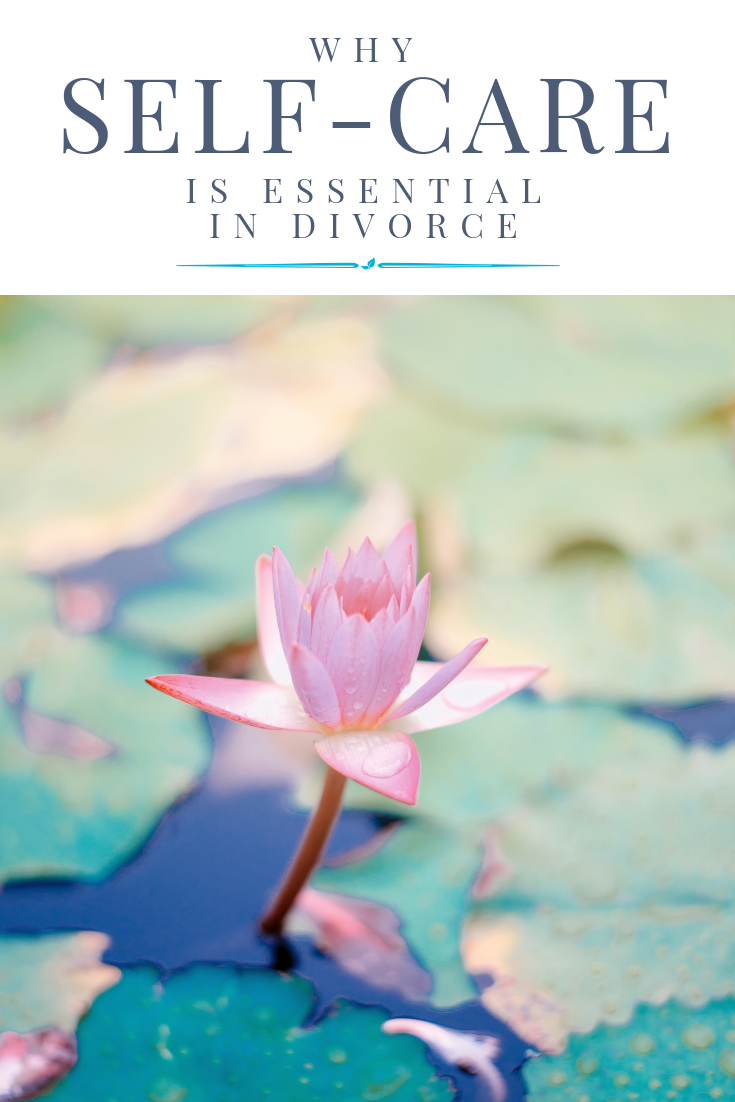Whether you initiated separation or the divorce came as a complete (and unwelcome) surprise, not prioritizing self-care in the process can contribute to a tougher time getting through the process or even lasting “divorce trauma.” In this month where so many are abuzz with love, romance and happily-ever-after, spotting these triggers and strategizing around them will pay dividends for you.
Put on your own air mask before helping others.
Many people view self-care as synonymous with being selfish. It is the opposite if you are going through the gut-wrenching pain of a divorce. Sadness, anger, confusion, guilt, helplessness, fear, rejection, blame, and loss of a dream – just about every color of the emotional rainbow will surface before this process is said and done. The trick is to not get stuck in these feelings for longer than need be. Now is the time to develop a dedicated self-care practice if you have never had one.
You must go through it to get through it.
I am a big believer in reminding my clients that this will end (eventually) and they will be happy (again). However, “this too shall pass” is hard to grasp onto especially when the legal part of the dissolution seems to be taking forever to conclude. While a spike in both anxiety and depression is to be expected in any phase of the proceedings, there are numerous techniques and tools to use right away to manage your emotions so you that you can focus on completing this difficult chapter.

Self-Care in Divorce
- Developing or turning back to a consistent spiritual practice. Prayer, meditation, gratitude journaling, spending time in nature or around beautiful art or music. Connecting with a wonderful friend. Visioning your new life. Whatever gives you a sense of short-term calm and long-term hopefulness is the goal.
- Using fitness and physical activity to combat anxiety and clear the mind. Physiological explanations abound for this phenomenon. Ours is not to ask why exercise helps, it just does. Whatever high or low impact work out appeals to you, this is one of the fastest and most consistent ways to turn around ruminating and catastrophizing, and the unrelenting “what ifs”. When in doubt, reach for the mind-body connection.
- Having boundaries – with yourself. Being overtaken by day-to-day, uncontrolled worry will do no one any favors. In her recent article about why you need a “divorce curfew,” Los Angeles therapist Virginia Gilbert, MFT, explains why “there is nothing good that comes from focusing on your divorce after 8 p.m.” By that same token, I suggest setting a time each week to think about your divorce, dispense with “divorce homework”, communicate with your lawyer the questions you have been saving up, and organize your thoughts and “to dos” on paper. If you have dedicated times to deal with your divorce each week, you may be less prone to periodic and intrusive thoughts outside those designated times, knowing that you will have “thought time” later. Keeping a journal by your bedside is an invaluable way to memorialize some of those fleeting questions and ideas you will want to re-visit with your lawyer or therapist.
- Having more boundaries – with well-intentioned others. I also suggest becoming conscious of those with whom you share your divorce story as it is unfolding. Divorce is one area where a lot of unsolicited advice is doled out, as well as not-so-productive “life comparing” amongst friends, relatives, and even acquaintances. Not everyone got through their divorce unscathed and many people carry significant emotional baggage even years after-the-fact. You can spot this unhealed pain because those with “divorce trauma” will want (and need) to tell you their story and “warn” you of many outcomes which, in reality, have no application to you. Their circumstances are not your circumstances – and these encounters can be very needlessly anxiety-provoking. Remember that your individual journey is unique. Sorting through the legal concerns you have with your attorney and through the emotional concerns you have with your therapist and getting the individual attention you need to your specific issues, are the safer bet.
- Managing (your own) expectations. Divorce is not fun, but it is also not a permanent state. In California, the mandatory waiting period is 6 months from filing and service to Judgment. However, the average length of a mostly uncontested divorce is approximately 1 – 2 years. Although daunting, it takes time to properly gather information, evaluate claims, and attempt to resolve differences in even a “simple” divorce. It also takes time to emotionally unravel the ties that bind. I have seen many a simple divorce sit informally “on hold” for months and years until both people are truly ready to tackle the uncoupling. On the other hand, I have seen many clients transform themselves from the inside out during their divorce. A weekend trip out of town can do wonders to shift perspective. A retreat or self-improvement course can spark inspiration for life ‘after’.
While it is good to keep your expectations realistic during the process, keeping your sanity is just as important. During this challenging time, do not skimp on, nor feel guilty about, self-care.
